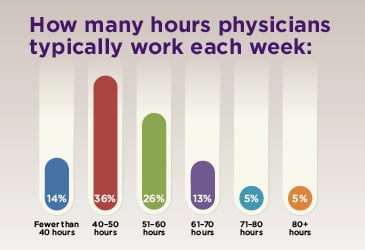Everyone knows that physicians generally work long hours. But just how many hours are in the typical physician workweek? Find out how your workweek compares to your peers.
Most physicians work between 40 and 60 hours per week, but nearly one-quarter of physicians work between 61 and 80 hours per week, according to the 2014 Work/Life Profiles of Today’s Physician released last year by AMA Insurance.
- About 20 percent of responding physicians aged 60 to 69 work fewer than 40 hours per week. Another 20 percent of this age group works more than 60 hours per week.
- About two-thirds of physicians aged 40 to 69 work between 40 and 60 hours per week. Another 20 percent work between 61 and 80 hours per week.
- For physicians under age 40, about two-thirds work between 40 and 60 hours per week. Of this age group, only 13 percent work fewer than 40 hours per week and 5 percent work more than 80 hours per week.
Across all age groups, roughly one-half of physicians said they would prefer to work fewer hours per week.
Some studies show that specialties with more work hours tend to have relatively low physician job satisfaction, and vice versa, according to a 2011 research letter in JAMA. “For example, pediatricians, dermatologists, and child and adolescent psychiatrists reported relatively low hours and have relatively high career satisfaction,” the letter said. “Similarly obstetrician and gynecologists reported relatively high hours and have relatively low career satisfaction.”
The letter also noted that specialists caring for more acutely ill patients or those requiring intensive monitoring, usually in hospital settings, work longer hours than physicians focused on more stable, chronically ill patients who are mostly in ambulatory settings. The exceptions were physicians practicing emergency medicine or hospital medicine because both of these specialties are characterized by fixed hourly shifts.
An AMA-RAND study released last fall revealed that physicians who feel overworked, overscrutinized or overburdened with unfulfilling tasks can suffer continually from a growing sense that they are neglecting the professional priorities that really matter—their patients. Through its Professional Satisfaction and Practice Sustainability initiative, the AMA is developing pragmatic solutions to enhance the practice of medicine and empower informed decision-making about physician practice environments.
Tell us: How do your work hours compare to your peers? Share what your typical workweek looks like in a comment below or on the AMA Facebook page.





